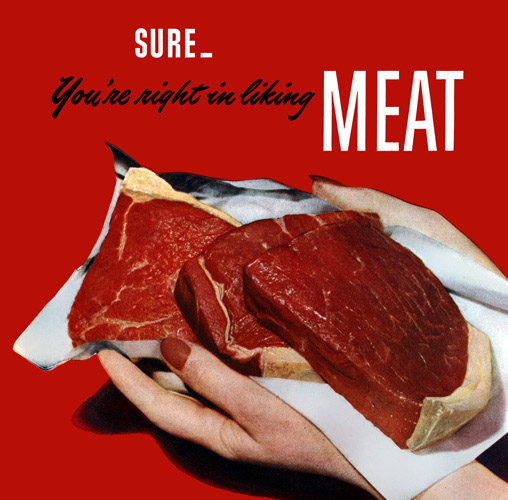Meat Is a Global Warming Issue
By Dan Brook, E Magazine

There are many human activities that contribute to global warming. Among the biggest contributors are electrical generation, the use of passenger and other vehicles, over-consumption, international shipping, deforestation, smoking and militarism. (The US military, for example, is the world's biggest consumer of oil and the world's biggest polluter. )
What many people do not know, however, is that the production of meat also significantly increases global warming. Cow farms produce millions of tons of carbon dioxide (CO2) and methane per year, the two major greenhouse gases that together account for more than 90 percent of US greenhouse emissions, substantially contributing to "global scorching. "
According to the United Nations Environment Program's Unit on Climate Change, "There is a strong link between human diet and methane emissions from livestock. " The 2004 State of the World is more specific regarding the link between animals raised for meat and global warming: "Belching, flatulent livestock emit 17 percent of the world's annual production of methane, a powerful greenhouse gas. "
The July 2005 issue of Physics World states: "The animals we eat emit 21 percent of all the CO2 that can be attributed to human activity." Eating meat directly contributes to this environmentally irresponsible industry and the dire threat of global warming.

Additionally, rainforests are being cut down at an extremely rapid rate to both pasture cows and grow soybeans to feed cows. The clear-cutting of trees in the rainforest -- an incredibly bio-diverse area with 90 percent of all species on Earth -- not only creates more greenhouse gases through the process of destruction, but also reduces the amazing benefits that those trees provide. Rainforests have been called the "lungs of the Earth," because they filter our air by absorbing CO2, while emitting life-supporting oxygen.
"In a nutshell," according to the Center for International Forestry Research, "cattle ranchers are making mincemeat out of Brazil's Amazon rainforests. "
Of course, the US should join the other 182 countries in ratifying the Kyoto Protocol. Of course, we should sharply reduce our reliance on fossil fuels and shift towards renewable sources of energy. Of course, we need to stop destroying the rainforests. Of course, we need to stop the war in Iraq and drastically reduce the US military budget (presently at half of the entire world's total military spending), which would increase, not decrease, national and global security. But as we're struggling and waiting for these and other structural changes, we need to make personal changes.
Geophysicists Gidon Eshel and Pamela Martin from the University of Chicago concluded that changing one's eating habits from the Standard American Diet (SAD) to a vegetarian diet does more to fight global warming than switching from a gas-guzzling SUV to a fuel-efficient hybrid car. Of course, you can do both.
Where the environment is concerned, eating meat is like driving a huge SUV.
According to Eshel, eating a vegetarian diet is like driving a mid-sized car or a reasonable sedan, and eating a vegan diet (no dairy, no eggs) is like riding a bicycle or walking.
Shifting away from SUVs and SUV-style diets, to much more energy-efficient alternatives, is key to fighting the warming trend.
Global warming is already having grave effects on our planet. Vegetarians help keep the planet cool in more ways than one.
Paul McCartney says,
"If anyone wants to save the planet, all they have to do is just stop eating meat. That's the single most important thing you could do. "
Andrea Gordon, in her article "If You Recycle, Why Are You Eating Meat?" agrees:
"There is a direct relationship between eating meat and the environment.
Quite simply,
you can't be a meat-eating environmentalist!?
Sorry folks. "
Vegetarianism and veganism is literally about life and death -- for each of us individually and for all of us together.
Eating animals simultaneously contributes to a multitude of tragedies:
the animals' suffering and death;
the ill-health and early death of people;
the unsustainable overuse of oil, water, land, topsoil, grain, labor and other vital resources;
environmental destruction, including deforestation, species extinction, mono-cropping and global warming;
the legitimacy of force and violence;
the mis-allocation of capital, skills, land and other assets;
vast inefficiencies in the economy;
tremendous waste;
massive inequalities in the world;
the continuation of world hunger and mass starvation;
the transmission and spread of dangerous diseases;
and moral failure in so-called civilized societies.
Going veg is the antidote to all of these unnecessary tragedies.
The editors of World Watch concluded that "the human appetite for animal flesh is a driving force behind virtually every major category of environmental damage now threatening the human future -- deforestation, erosion, fresh water scarcity, air and water pollution, climate change, biodiversity loss, social injustice, the destabilization of communities and the spread of disease." Lee Hall, the legal director for Friends of Animals, is more succinct: "Behind virtually every great environmental complaint there's milk and meat. "
Global warming may be the most serious global social problem threatening life on Earth. We need to fight global warming on the governmental and corporate levels, and we also need to fight global warming on the everyday and personal levels.
Now we need to fight global warming -- with our forks!

April 22 is Earth Day
People across the planet are taking steps to go “green” by changing light bulbs and driving habits. Yet with the unmistakable connections between factory farming and the destruction of our environment, the most effective change one can make for the earth is a change to a plant-based diet. With animal agriculture accounting for more dangerous greenhouse gases than the entire transportation sector — making it one of the leading causes of climate change — there is no better time to act than right now.
Go green for Earth Day by choosing a vegan diet

Celebrate Earth Day Everyday: Go Vegan
Repost from Help make a difference (www.myspace.com/choosecompassion)
Repost from David Dvorak (www.myspace.com/dmdflipsider)
Repost from Marri Dutch (www.
_______________________________________________

Peace
_________________________________________________


1 comment:
I also feel healthier since I started my vegetarian lifestyle.
Post a Comment